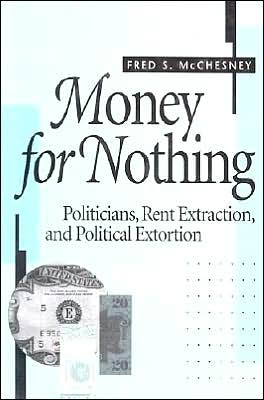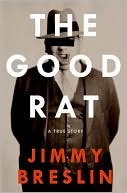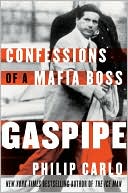Money for Nothing: Politicians, Rent Extraction, and Political Extortion
Surveys reveal that a majority of Americans believe government is run for special interests, not public interest. The increased presence and power of lobbyists in Washington and the excesses of PAC and campaign contributions, in-kind benefits, and other favors would seem to indicate a government of weak public servants corrupted by big private-interest groups.\ But as Fred McChesney shows, this perspective affords only a partial understanding of why private interests are paying, and what they...
Search in google:
Surveys reveal that a majority of Americans believe government is run for special interests, not public interest. The increased presence and power of lobbyists in Washington and the excesses of PAC and campaign contributions, in-kind benefits, and other favors would seem to indicate a government of weak public servants corrupted by big private-interest groups.But as Fred McChesney shows, this perspective affords only a partial understanding of why private interests are paying, and what they are paying for. Consider, for example, Citicorp, the nation's largest banking company, whose registered lobbyists spend most of their time blocking legislation that could hurt any one of the company's credit-card, loan, or financial-service operations. What this scenario suggests, the author argues, is that payments to politicians are often made not for political favors, but to avoid political disfavor, that is, as part of a system of political extortion or "rent extraction."The basic notion of rent extraction is simple: because the state can legally take wealth from its citizens, politicians can extort from private parties payments not to expropriate private wealth. In that sense, rent (that is, wealth) extraction is "money for nothing"—money paid in exchange for politicians' inaction. After constructing this model of wealth extraction, McChesney tests it with many examples, including several involving routine proposals of tax legislation, followed by withdrawal for a price. He also shows how the model applies more generally to regulation. Finally, he examines how binding contracts are written between private interests and politicians not to extract wealth.This book, standing squarely at the intersection of law, political science, and economics, vividly illustrates the patterns of legal extortion underlying the current fabric of interest-group politics. Gregory E. Maggs - The Green Bag McChesney has kept his study concise and easygoing despite including technical economic analysis. He has a fine sense of humor, reflected in the witty epigrams at the start of each chapter and the occasional cartoon that he has included...As one of the first economists to study in depth how private parties make payments to avoid regulation, McChesney has broken new ground and written a provocative book.
PrefaceIntroduction11Background: The Economic Theory of Regulation72Rent Extraction: The Theory of Political Extortion203Observing Extortion: The Practice of Rent Extraction454Validating the Model: Empirical Tests of Rent Extraction695Contracting for Rent Preservation: The Durability Problem866Extraction and Optimal Taxation: Excises, Earmarked Taxes, and Government User Charges1137Costs and Benefits of Interest-Group Organization1338Improving the Model: Worthy yet Unanswered Questions156Notes173References197Index211
\ The Green BagMcChesney has kept his study concise and easygoing despite including technical economic analysis. He has a fine sense of humor, reflected in the witty epigrams at the start of each chapter and the occasional cartoon that he has included...As one of the first economists to study in depth how private parties make payments to avoid regulation, McChesney has broken new ground and written a provocative book.\ — Gregory E. Maggs\ \ \ \ \ \ BooknewsAn analysis of private interest groups illustrating a pattern of political reciprocity that McChesney (law, Emory U.) terms "rent extraction." The author poses a simple thesis, demonstrating how private parties pay politicians not to expropriate private wealth, thus paying "rent" for their money. The author tests his model with examples of proposals of tax legislation which are withdrawn for a price, regulation legislation, and finally, examines the contracts written between private interests and politicians centered on political inaction devoted to keeping wealth in private hands. Annotation c. by Book News, Inc., Portland, Or.\ \








